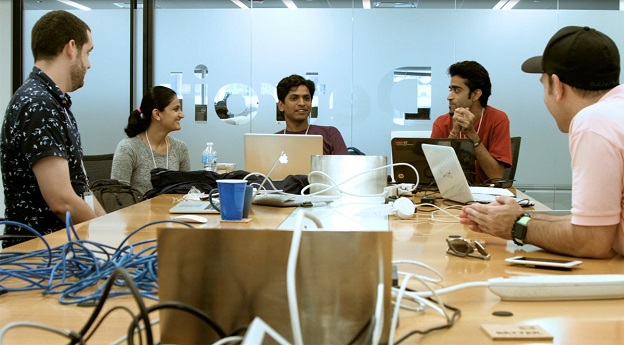
CHICAGO—The real estate industry has historically been somewhat disconnected from the latest trends and products developed in the tech world. But Houston-based Transwestern has just attempted to bridge that gap by holding CREforge, the first-of-its-kind commercial real estate hackathon, a competitive event that challenges software designers, coders and developers to solve everyday problems.
More than 150 people, including speakers, exhibitors and programmers, participated in the three-day event, held from Aug. 26 to Aug. 28 at the company's Midwest headquarters in downtown Chicago. The techies brought in by Transwestern worked with Heitman Architects, Leopardo Cos. and ConneXion to brainstorm about projecting 3D building renderings onto everything from tabletops to land sites, capturing emotional data to inform the design of an office interior, filling vacancies by utilizing dating-site algorithms to “match” commercial tenants with landlords through a bidding process, and other topics.
A panel of judges comprising tech industry leaders evaluated each of the solutions presented.
“It's no secret that commercial real estate is a late adopter of technology,” says Mike Watts, Transwestern's Midwest president. “Our industry is ripe for innovation, and there's no better place to move the needle than Chicago, home to one of the fastest-growing tech communities in the country.”
“CREforge is a way for us to show other real estate professionals – everyone from architects and developers to brokers and service providers – how we all can use technology to overcome obstacles and change the way we do business,” he adds. “While the hackathon itself is over, our effort to 'forge' a synergistic relationship between tech and real estate is just beginning.”
Because of how successful the Chicago hackathon was, Transwestern is exploring the possibility of hosting similar events in other markets, a company spokesperson tells GlobeSt.com.

Officials from Itasca, IL-based Heitman came to CREforge hoping to discover new ways of assisting clients in visualizing how a completed renovation or development. A team of developers used augmented reality – in which a real-world environment is digitally enhanced with text or graphics, most recently publicized by Pokémon GO – to create a tool that would allow Heitman to project a scalable 3D rendering of a finished project on anything from a tabletop to a multi-acre development site.
“This tool enables us and, more importantly, our clients to see designs through an entirely new lens, providing a 360-degree view of a project before it's actually built,” says Karl Heitman, president. “With this technology, we can share our design vision with clients in a realistic virtual overlay that transforms their view of existing conditions. This enhanced 'augmented' view of reality transports our clients virtually into our designs in real time. The result is that they become co-participants and take ownership of the vision.”
“Until now, there's been a tangible disconnect between our industry and the innovative ideas coming out of Chicago-based startup incubators and accelerators like 1871 and Elmspring,” Watts says. “The workforce is changing and young professionals raised in the digital era want to be surrounded by technology at work as well as at play. The revolution in real estate begins now, and we are thrilled to be leading the way.”

CHICAGO—The real estate industry has historically been somewhat disconnected from the latest trends and products developed in the tech world. But Houston-based Transwestern has just attempted to bridge that gap by holding CREforge, the first-of-its-kind commercial real estate hackathon, a competitive event that challenges software designers, coders and developers to solve everyday problems.
More than 150 people, including speakers, exhibitors and programmers, participated in the three-day event, held from Aug. 26 to Aug. 28 at the company's Midwest headquarters in downtown Chicago. The techies brought in by Transwestern worked with Heitman Architects, Leopardo Cos. and ConneXion to brainstorm about projecting 3D building renderings onto everything from tabletops to land sites, capturing emotional data to inform the design of an office interior, filling vacancies by utilizing dating-site algorithms to “match” commercial tenants with landlords through a bidding process, and other topics.
A panel of judges comprising tech industry leaders evaluated each of the solutions presented.
“It's no secret that commercial real estate is a late adopter of technology,” says Mike Watts, Transwestern's Midwest president. “Our industry is ripe for innovation, and there's no better place to move the needle than Chicago, home to one of the fastest-growing tech communities in the country.”
“CREforge is a way for us to show other real estate professionals – everyone from architects and developers to brokers and service providers – how we all can use technology to overcome obstacles and change the way we do business,” he adds. “While the hackathon itself is over, our effort to 'forge' a synergistic relationship between tech and real estate is just beginning.”
Because of how successful the Chicago hackathon was, Transwestern is exploring the possibility of hosting similar events in other markets, a company spokesperson tells GlobeSt.com.

Officials from Itasca, IL-based Heitman came to CREforge hoping to discover new ways of assisting clients in visualizing how a completed renovation or development. A team of developers used augmented reality – in which a real-world environment is digitally enhanced with text or graphics, most recently publicized by Pokémon GO – to create a tool that would allow Heitman to project a scalable 3D rendering of a finished project on anything from a tabletop to a multi-acre development site.
“This tool enables us and, more importantly, our clients to see designs through an entirely new lens, providing a 360-degree view of a project before it's actually built,” says Karl Heitman, president. “With this technology, we can share our design vision with clients in a realistic virtual overlay that transforms their view of existing conditions. This enhanced 'augmented' view of reality transports our clients virtually into our designs in real time. The result is that they become co-participants and take ownership of the vision.”
“Until now, there's been a tangible disconnect between our industry and the innovative ideas coming out of Chicago-based startup incubators and accelerators like 1871 and Elmspring,” Watts says. “The workforce is changing and young professionals raised in the digital era want to be surrounded by technology at work as well as at play. The revolution in real estate begins now, and we are thrilled to be leading the way.”
Want to continue reading?
Become a Free ALM Digital Reader.
Once you are an ALM Digital Member, you’ll receive:
- Breaking commercial real estate news and analysis, on-site and via our newsletters and custom alerts
- Educational webcasts, white papers, and ebooks from industry thought leaders
- Critical coverage of the property casualty insurance and financial advisory markets on our other ALM sites, PropertyCasualty360 and ThinkAdvisor
Already have an account? Sign In Now
*May exclude premium content© 2025 ALM Global, LLC, All Rights Reserved. Request academic re-use from www.copyright.com. All other uses, submit a request to [email protected]. For more information visit Asset & Logo Licensing.








